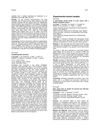 January 2019 in “Research Square (Research Square)”
January 2019 in “Research Square (Research Square)” The trial will test if YH0618 granule prevents hair loss in breast cancer patients during chemotherapy.
 May 2024 in “FEBS open bio”
May 2024 in “FEBS open bio” Annurca apple extract may help treat hair loss and protect against oxidative stress.
 17 citations,
January 2019 in “Journal of cancer”
17 citations,
January 2019 in “Journal of cancer” The formula YH0618 can reduce the harmful side effects of the chemotherapy drug Doxorubicin and protect healthy cells.
63 citations,
February 2017 in “ACS biomaterials science & engineering” Polydopamine is a safe, effective, and permanent hair dye that turns gray hair black in one hour.
 October 2004 in “Radiotherapy and oncology”
October 2004 in “Radiotherapy and oncology” Active vitamin D3 might protect hair follicles from radiation damage.
 13 citations,
December 2017 in “The journal of investigative dermatology/Journal of investigative dermatology”
13 citations,
December 2017 in “The journal of investigative dermatology/Journal of investigative dermatology” Nicotinamide applied to the scalp can slow down hair growth.
 July 2024 in “Journal of Investigative Dermatology”
July 2024 in “Journal of Investigative Dermatology” A single medium, PRIME AIRLIFT, supports better human hair follicle formation in grafts.
 4 citations,
October 2017 in “Advances in tissue engineering & regenerative medicine”
4 citations,
October 2017 in “Advances in tissue engineering & regenerative medicine” Researchers created a potential skin substitute using a biodegradable mat that supports skin cell growth and layer formation.
 January 2023 in “Biocell”
January 2023 in “Biocell” Safflower extract helps protect hair follicle cells from damage caused by chemotherapy.
January 2024 in “Molecules/Molecules online/Molecules annual” Suaeda glauca and its compounds could be new treatments for hair loss.
29 citations,
April 2017 in “Macromolecular bioscience” Scientists created tiny pH-sensing gels that can safely measure the pH levels inside hair follicles.
 November 2024 in “Plants”
November 2024 in “Plants” Et-BB3-CMU rice bran extract may be a promising natural option for promoting hair growth and preventing hair loss.
 December 2024 in “Frontiers in Pharmacology”
December 2024 in “Frontiers in Pharmacology” Araliadiol may promote hair growth like minoxidil without being toxic.
 109 citations,
October 2007 in “Journal of pineal research”
109 citations,
October 2007 in “Journal of pineal research” Melatonin helps regulate hair growth and protects the hair follicle from stress.
 1 citations,
September 2023 in “Journal of Investigative Dermatology”
1 citations,
September 2023 in “Journal of Investigative Dermatology” Melatonin may protect hair follicle cells from damage caused by a chemotherapy drug.
 30 citations,
May 1999 in “Food and chemical toxicology”
30 citations,
May 1999 in “Food and chemical toxicology” Procyanidin B-2 is safe to use on skin as a hair growth product.
 113 citations,
November 2017 in “Scientific Reports”
113 citations,
November 2017 in “Scientific Reports” Tiny particles from stem cells help activate hair growth cells and encourage hair growth in mice without being toxic.
99 citations,
September 2007 in “The American journal of pathology” Chemotherapy damages hair follicles, causing hair loss and other cellular changes.
 April 2024 in “Skin appendage disorders”
April 2024 in “Skin appendage disorders” Environmental pollutants can damage hair health and cause hair loss.
 January 2023 in “Journal of cosmetic dermatology”
January 2023 in “Journal of cosmetic dermatology” The synthetic retinoid EC23 thickens skin and promotes hair growth more effectively and with a lower dose than natural retinoids.
 1 citations,
January 2018 in “Springer eBooks”
1 citations,
January 2018 in “Springer eBooks” The document concludes that scalp cooling and treatments like minoxidil can help manage hair loss from cancer therapy.
 14 citations,
August 2016 in “Journal of nanomedicine research”
14 citations,
August 2016 in “Journal of nanomedicine research” Zinc oxide nanoparticle biscuits improved growth and health in zinc-deficient rats without toxicity.
 11 citations,
September 2019 in “Dermatologic Surgery”
11 citations,
September 2019 in “Dermatologic Surgery” A substance called Vascular Endothelial Growth Factor can protect certain hair follicle stem cells from damage caused by androgens, suggesting a new possible treatment for hair loss.
 434 citations,
October 2003 in “PTR. Phytotherapy research/Phytotherapy research”
434 citations,
October 2003 in “PTR. Phytotherapy research/Phytotherapy research” Natural products in cosmetics are beneficial for skin and hair care with low toxicity.
September 2021 in “Faculty Opinions – Post-Publication Peer Review of the Biomedical Literature”  1 citations,
October 2022 in “Annals of Translational Medicine”
1 citations,
October 2022 in “Annals of Translational Medicine” Cucurbitacin helps mice grow hair by blocking a protein that stops hair growth.
 November 1998 in “Journal of The European Academy of Dermatology and Venereology”
November 1998 in “Journal of The European Academy of Dermatology and Venereology” A man's skin cancer improved and some of his hair grew back after treatment with a special light therapy and a medication.
 March 2024 in “Bioactive Materials”
March 2024 in “Bioactive Materials” New treatment using engineered nanovesicles in hydrogel improves hair growth by repairing hair follicle cells in a mouse model of hair loss.
 316 citations,
June 2004 in “The journal of investigative dermatology/Journal of investigative dermatology”
316 citations,
June 2004 in “The journal of investigative dermatology/Journal of investigative dermatology” Microspheres about 1.5 micrometers in size can best penetrate hair follicles, potentially reaching important stem cells.
November 2022 in “Molecular Pharmaceutics” cp-asiAR may effectively treat androgenetic alopecia by promoting hair growth and reducing androgen receptor activity.























